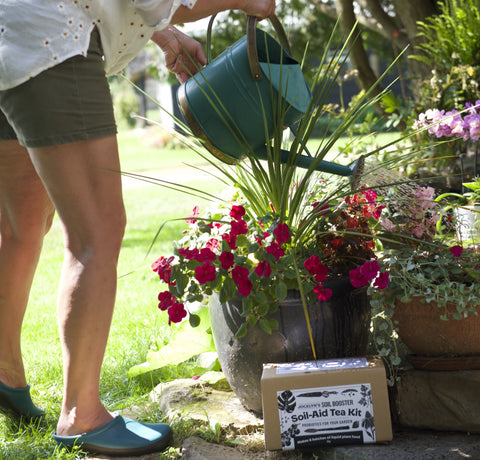How to Get Microbes Working for You:
Soak Seeds with a Biological Inoculant for Better Germination
Inoculating seeds with biology is an easy regenerative growing tool that works with Mother Nature to naturally encourage healthy seed germination and growth of new seedlings.
Inoculation is defined as “to introduce (something, such as a microorganism) into a suitable situation for growth.” Essentially this technique is about coating the seed with beneficial biology to help ensure the seed’s germination and healthy growth. By soaking the seed in our Soil-Aid Tea, the microbes are transferred from the Tea onto the outer coating of the seed directly before planting.

While the science is very new on the mechanisms of action, it appears one of the important factors at play is communication between microbes external to the seed and those that are contained within the seed.
The latest science shows that microbes outside the seed communicate with microbes inside the seed to know how and when to germinate. When seeds germinate in sterile soil - that is, soil without any microbes - the result is very shallow roots running horizontally below the surface and increased leaf growth. This suggests that microbiology in the soil plays an important in root formation so that the baby plant knows “where to put down roots" and focuses effort on establishing healthy root systems that set a foundation for successful growing season.
Furthermore, once the seed has sprouted, it immediately begins working with microbial partners in the surrounding soil to search out the nutrition required to flourish and thrive. By soaking the seeds in a biological inoculant, we ensure the required microbes are ready and waiting to feed the sprout as soon as necessary.
Not all seeds are suitable for seed soaking. Generally larger seeds with thicker protective coatings are best suited for seed soaking as smaller, more delicate seeds can get damaged through the process. We recommend seed soaking for the following types of seeds:
- Peas
- Beans
- Squash
- Chard
- Beets
- Cucumber
- Sunflower
- Lupine
Remember that it’s very important that soaked seeds are not allowed to dry out; make sure you’re ready to plant those seed in some soil before starting the soaking process!
Check out the How-to Video below for a quick demo on how to soak your seeds in a biological inoculant such as our Soil-Aid Tea Kit.
